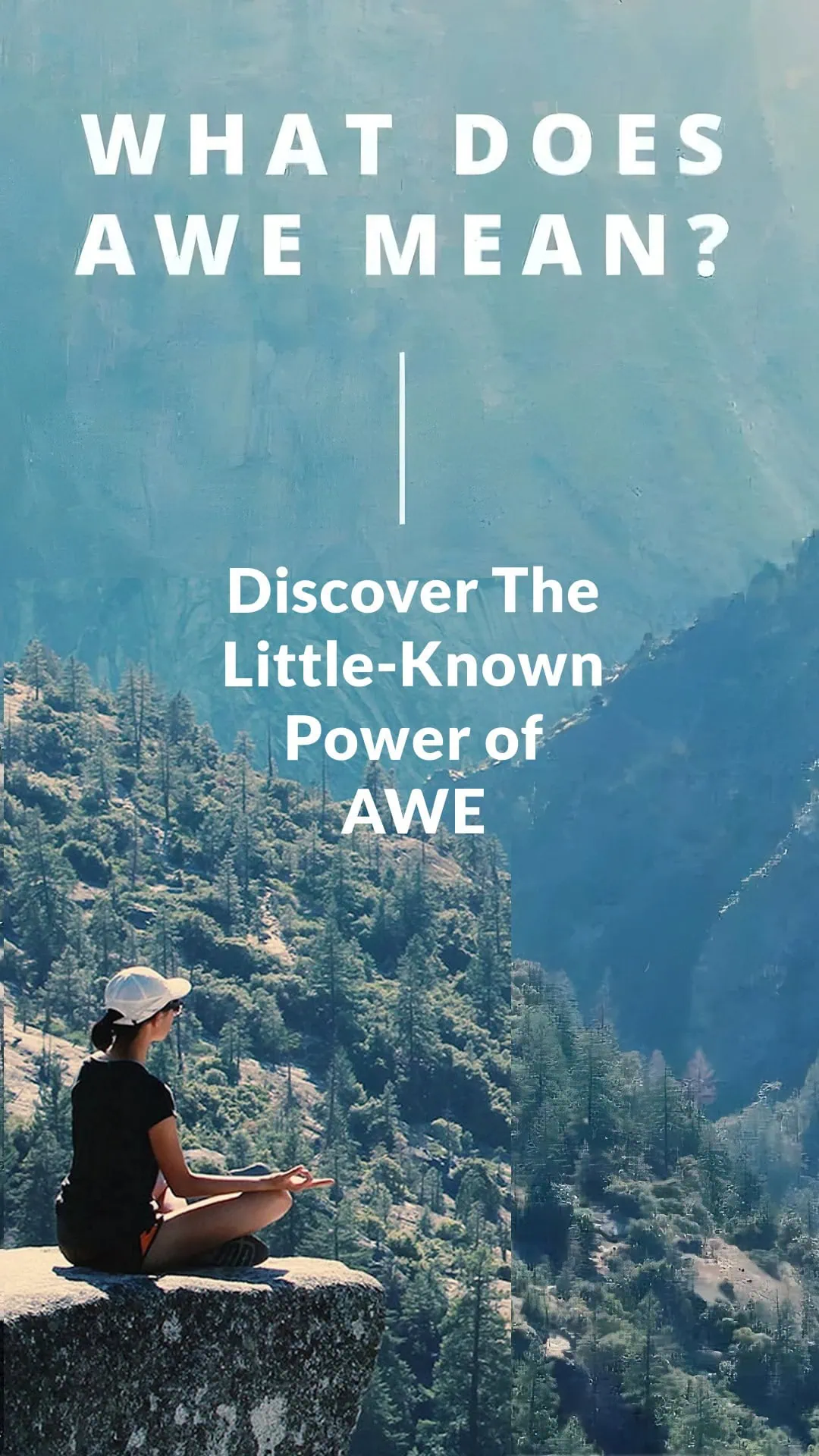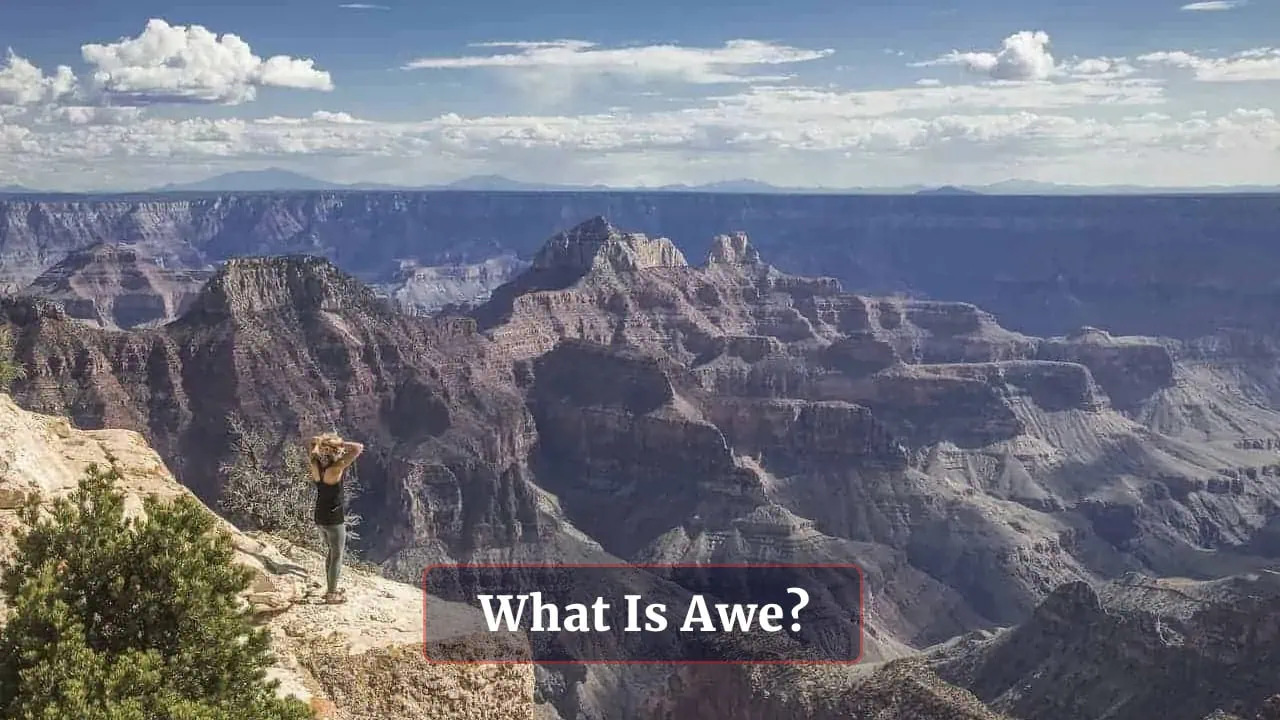Today's Friday • 11 mins read
When you visit the Grand Canyon, you walk through a 6,000-foot-deep, 270-mile-long natural gorge carved by the Colorado River over six million years.
Nearly 2 billion years of Earth’s terrestrial history is laid out in front of you.
You stand frozen as this mesmerizing panorama engulfs you. What fills you at that moment is an exhilaratingly overwhelming sensation.
That sensation is “awe.”
What Is Awe?
Awe is a transcendent emotional response to an extraordinary thing, event, or person. This intense feeling is a mix of fear, admiration, delight, and surprise. Awe-inspiring objects are often extremely beautiful, enormous in size, or exceptionally significant in any other way.
We may define awe as both a sense of wonder and fear, which can transfix your gaze.
Awe isn’t pure wonder because wonder does not frighten you. It isn’t pure fear because fear often makes you look away.
What Does Awe Mean In The Real World?
Beyond its scientific definition, the real-world meaning of awe can be: Awe is a potent combination of fear, admiration, delight, and surprise.
You’re terrified in the presence of awe, but you still want to experience its thrill.
Awe is a powerfully overwhelming sensation. Awe hypnotizes you into stillness, both physically and mentally, making you realize it’s unlike anything you’ve experienced before.
Awe almost always causes you to freeze because of its vast and extraordinary scale.
Perhaps, we can not explain awe as well as we can experience it. Awe does not share this quality with any other positive feeling.

The most beautiful thing we can experience is the mysterious. It is the source of all true art and all science. He to whom this emotion is a stranger, who can no longer pause to wonder and stand rapt is awe, his eyes are closed.
— Albert Einstein
What Does Awe Mean In Psychology?
Psychologically, awe is an emotional response to exceptionally vast stimuli or events that exceed one’s usual range of reference in some area and surpass one’s existing knowledge.
Awe has a positive, prosocial, self-transcendent value strongly associated with a reward, and affects one’s self-awareness, time perception, life satisfaction, and humility.
According to Keltner & Haidt (2003), “awe” can be of 5 types or “flavorings”:
- Threat-based Awe
- Beauty-based Awe
- Ability-based Awe
- Virtue-based Awe
- Supernaturality-based Awe
Keltner and Haidt also proposed awe has two central features:
- Perception of Vastness — Vastness refers to immensity in physical size, social status, scope, or complexity.
- Need for Accommodation (NFA) — NFA refers to the requirement of a new mental schema to accommodate experiences outside existing schemas.

Neuroscience of Awe: What Is Awe In The Brain
A sense of awe reduces activity in the default mode network (DFN)—the regions of the brain that become active when one focuses on the world outside them.
The DFN includes the medial prefrontal cortex, posterior cingulate cortex, inferior parietal lobe, hippocampus, and precuneus.
According to Guan & Xiang (2018), the medial temporal gyrus (MTG) of the brain is important in the identification and resolution of incongruity while experiencing socioemotional awe.
Origin & Evolution of Awe
The word “awe” is derived from words in Old English and Old Norse that expressed “fear and dread, particularly toward a divine being.”
Awe, in humans, started as an overwhelming feeling when humans were in the presence of something immensely powerful, so much more than anything they had ever come across before.
The early humans reserved their awe for their gods and kings.
Dacher Keltner and Jonathan Haidt suggest that our emotions of awe originated from feelings of primordial awe.
This primordial awe would occur when a high-status person who was vast in size, fame, authority, or prestige came before a low-status person.
Think of an ancient civilization whose subjects always felt the power of awe of their king. It required the latter to change the mental imagery of their known world to accommodate this new experience.
That primordial awe later generalized into any stimulus that was both vast and that required the need for accommodation (NFA) and became our modern awe.
How Can You Feel The Power of Awe?
Are you too capable of feeling awe as many others do? In all probability, yes. Still, if you’re not sure, do this. Ask yourself a few of the questions below to find out if you, to,o can experience awe in your life:
- Do I feel a positive emotional connection to people, music, art, or nature that evokes a sense of wonder in me?
- Do I seek out fascinating experiences that challenge my understanding or expectations about the world?
- Do I feel like a child who is awestruck when I face novel experiences, outstanding ideas, or the beauty of nature?
- Do I look for and nurture the incredible moments that inspire awe in me?
- Do I often marvel at how amazing it is to be simply alive in this world full of uncertainties?
If you answered Yes to any of those, you could bet you’re quite capable of feeling the raw power of awe. Science says women feel awe more frequently than men.
Our ability to feel awe increases with age.
What Triggers Awe?
Some of the ways to feel a sense of awe:
- Gazing into the vast expanse of a star-filled sky
- Watching a double rainbow over the Niagara Falls
- Looking at the Taj Mahal lit up by a full moon
- Watching 150 people practicing yoga on a sky-high glass platform on the outskirts of Beijing.
- Seeing our planet turning around in a black sea of space, caught by an astronaut’s camera from the International Space Station (ISS)

But those are not the only places you can find awe. To feel awe, it does not matter where you stay. We can feel awe in our daily lives. Awe is not a simple sense of wonder, but a feeling that peeks out from a veiled sense of ordinary fear. And that can happen anywhere.
You could stay in an ordinary neighborhood and still feel awe in watching the morning sun come up against a dusty sky. Or in seeing a small plant forcing up through the cracks of an abandoned concrete plate. Or in hearing the sudden burst of unbridled laughter from your child.
A 2015 study in the Journal of Personality and Social Psychology suggested two ways to fill yourself with awe:
- watching an astonishing nature video,
- gazing up at a giant, towering tree.
Awe & The Towering Eucalyptuses (Social Experiment)
Piff, a professor of psychology and social behavior at the University of California, Berkeley, staged an experiment in a grove of blue gum Eucalyptus trees near the Museum of Paleontology at the university. Read Professor Piff’s research here.
Now, these blue gum trees had come from Tasmania. An Oakland developer, Frank Havens, planted them between 1910 and 1914, wanting to get rich fast by selling them as timber. But somehow, he could not sell them. So, the trees stood.
- In 2015, a group of scientists led by Professor Paul K. Piff took ninety students to a grove of 200+ feet tall Tasmanian Eucalyptus trees. These trees are the tallest stand of hardwood trees in North America. Just looking up at them can create an enormous sense of awe.
- They made an odd request to the students. One group was to watch a tall building, and another was to stare at the towering trees. Each for a full 1 minute.
- Then, as a student walked across, an experimenter appeared and dropped a bunch of pens. Piff and his team wanted to find out which of the students helped pick up the pens.
- They found that those who stopped and helped pick up the pens were mostly those who had watched the giant eucalyptus trees earlier. But why?
- Watching the tall trees filled the study participants with a sense of AWE. And this made them more generous and helpful.
The Piff experiment at the Blue Gum Grove showed the world that “awe” could make us more sympathetic and helpful. But a sense of awe can also inspire a host of other feelings in us.
What Are Some Benefits of Awe?
Awe can make us:
- more compassionate, more humble
- more altruistic, less selfish
- deeply curious
- less tolerant of uncertainty
- lose the sense of time
- feel a sense of spiritual elevation
Awe creates a deep state of curiosity in which we sense the world without the filter of our experiences.
According to Michelle Lani Shiota, professor of psychology at Arizona State University, awe involves a sense of uncertainty that we feel compelled to try to resolve.
Research by Piercarlo Valdesolo suggests awe increases both supernatural belief and intentional-pattern perception.
They concluded that experiences of awe diminished tolerance for uncertainty, which, then, increased the tendency to believe in nonhuman agents and to perceive human agency in random events.
Your body reacts to awe in a very different way than any other positive emotion.
You gaze deep at your thing of awe, standing wide-eyed in a shock of fascination, stuck motionless to the ground beneath your feet, your jaw dropped open, your inner eyebrows lifted, and your heart slowed down.
Awe stops the sands in the clock, and time stalls.
An experience of true awe engulfs you and re-frames your life in a way you never imagined before. It elevates your soul.
Paul Pearsall, a psychiatry professor and clinical neuropsychologist, wrote in his final book Awe: The Delights and Dangers of Our Eleventh Emotion:
If we go beyond a kind of ignorant distant voyeurism through which we gawk at life rather than fully engage with it and put in the effort to try to understand a little more about life’s meaning, awe becomes less a feeling of being high and more a feeling of deep immersion in any and all of life’s processes, including health, illness, love, and even the end.
By the way, that overused urban buzzword “awesome” — a foppish word in every sense — can never stand a tolerable yard close to the sublime awe.
Does Awe Make Us Better As Humans?
How many times in your life have you got yourself struck by awe? Perhaps many. But did you ever stop to think about how it influences you? How did it affect your behavior and your relationships?
- When you sense awe, it can make you feel more generous and humble. Awe makes you feel more satisfied with your life at the moment. After awe, you start to value experiences much more than things and stuff.
- Awe diminishes our sense of self and shifts our focus away from selfish interests and concerns. After awe, you tend to cooperate, share resources, and sacrifice more for others. Those who experienced awe reported a feeling of a “small self” triggering more generous behavior.
- Awe can sharpen your thinking and can even make you less vulnerable to weak arguments. Awe reduces reliance on your internal knowledge in processing new events, as a 2017 study found.
- Awe can counteract dangerous chronic inflammation. Jennifer Stellar from Berkeley Lab recently documented that of all the positive emotions we experience, only awe predicted reduced levels of an inflammatory messenger system in the human body called cytokines.
- Shiota and Keltner found in a separate study that those who regularly found awe scored more on openness to experience and extroversion in the Big Five personality scale.
Final Words
Since the days of early human history, awe has kept its promise of holding us arrested for a few minutes out of our ordinary lives. Awe remains to serve us to see the extraordinary within the ordinary.
Dacher Keltner says,
That awe, wonder and beauty promote healthier levels of cytokines suggests that the things we do to experience these emotions – a walk in nature, losing oneself in music, beholding art – have a direct influence upon (our) health and life expectancy.
So, get out into nature, visit a museum, hear some beautiful music, or take a little time to marvel at the wonder around us that is life. Give yourself a chance to truly feel what awe means. Let the little-known power of awe make you a better human being.
“Flow” is a state of immersion into a timeless, self-contained universe.
In “flow” state, you become one with the thing you’re doing.
√ If you liked it, please spread the word.
» You deserve happiness! Choosing therapy could be your best decision.
...
• Disclosure: Buying via our links earns us a small commission.
